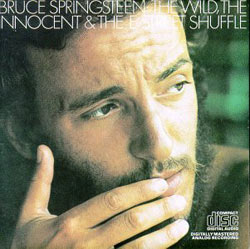
The Wild, the Innocent and the E-Street ShuffleAufgenommen im Juli, August 1973 in den 914 Sound Studios, Blauvelt, N.Y.
Veröffentlicht am 05. November 1973
Mitwirkende Künstler: Bruce Springsteen - Gitarre, Gesang, Harmonika, Bass
Danny Federici - Keyboards, Gesang
Clarence Clemons - Saxophon, Gesang
Vini Lopez - Drums, Gesang, Horn
Garry Tallent - Bass
Albany Tellone - Saxophon
Richard Blackwell - Percussion
Shuki Lahav - Gesang
Albee Tellone - Saxophon
Produktion: Lois Lahav - Tonmeister
David Gahr - Coverfoto
Theresa Alfiere - Cover Design
Tracklist: The E Street Shuffle
4th of July, Asbury Park (Sandy)
Kitty's Back
Wild Billy's Circus Story
Incident on 57th Street
Rosalita (Come Out Tonight)
New York City Serenade
Infos:Nach dem Erscheinen von "Greetings from Asbury Park" wurde sein damaliger Ansprechpartner bei CBS Records fristlos gefeuert. Clive Davis war neben Hammond immer der grösste Befürworter und Förderer von Bruce Springsteen gewesen.
Bruce Springsteen ging im Sommer 1973 wieder ins Studio und nahm sein zweites Album auf.
Für "The Wild, the Innocent and the E-Street Shuffle" wurden viele sogenannte Outtakes aufgenommen, die aber niemals veröffentlicht wurden, z.B. "SOMETHING YOU GOT", "PHANTOMS", SEASIDE BAR SONG" sowie "THUNDERCKRACK".
Weitere Songs, die für "The Wild, the Immocent and the E Street Shuffle" aufgenommen wurden:
- Angel's Blue
- Secret to the Blues
- Phantoms
- Evacuation of the West
- The Fever
- Santa Ana
- New York Song
- Shootout in Chinatown
- Small Town
- The Late Show
- Helen Blue
- Daytona Mission
Nach dem Erscheinen der zweiten Platte weigerte sich CBS Werbung für das Album zu machen. Doch die Musikkritiker waren von "The Wild, The Innocent and the E-Street Shuffle" hellauf begeistert. Jon Landau, damals einer der wichtigsten Musikkritiker des ganzen Landes schrieb in seinem Bericht im Real Paper "I saw rock and roll future and its name is Bruce Springsteen".
Kritik aus dem Rolling Stone Magazin:Greetings from Asbury Park, Bruce Springsteen's uproarious debut album, sounded like "Subterranean Homesick Blues" played at 78, a typical five-minute track bursting with more words than this review. Most of it didn't make much sense, but that was the point. Springsteen was rhyming and wailing for the sheer fun of it, and his manic exuberance more than canceled out his debts to Dylan, Van Morrison and the Band. The Wild, the Innocent and the E Street Shuffle takes itself more seriously. The songs are longer, more ambitious and more romantic; and yet, wonderfully, they lose little of Greetings' rollicking rush. Having released two fine albums in less than a year, Springsteen is obviously a considerable new talent.
Like Greetings, the new album is about the streets of New York and the tacky Jersey Shore, but the lyrics are no longer merely zany cut-ups. They're striking amalgams of romance and gritty realism: "And the boys from the casino dance with their shirts open like Latin lovers on the shore,/ Chasin' all those silly New York virgins by the score." The loveliness of the first line, the punk savvy of the second, and the humor of the ensemble add up to Springsteen's characteristic ambivalence and a complex appeal reminiscent of the Shangri-Las. In the midst of a raucous celebration of desire, "Rosalita," he can suddenly turn around and sing, "Some day we'll look back on this and think we all seem funny."
But none of this would matter if the music were humdrum -- it isn't. The band, especially David L. Sancious on keyboards and Clarence Clemons on saxes, cook with power and precision, particularly on "Rosalita" and "Kitty's Back," the album's outstanding rockers. They're essentially an R&B outfit -- funky-butt is Springsteen's musical pied-a-terre -- but they can play anything thrown at them, be it jazz or Highway 61 Revisited. Springsteen himself is an undistinguished but extremely versatile guitarist, which he needs to be to follow his own changes.
Springsteen is growing as a writer of music as well as of words. The best of his new songs dart and swoop from tempo to tempo and from genre to genre, from hell-bent-for-leather rock to luscious schmaltz to what is almost recitative. There is an occasional weak spot or an awkward transition, but for the most part it works spectacularly, and nowhere to more dramatic effect than on "Incident on 57th Street," the album's most stunning track, a virtual mini-opera about Johnny, a "romantic young boy" torn between Jane and the bright knives out on the street. Springsteen never resolves the conflict (if he ever does his music will probably become less interesting). Instead he milks it for all it's worth, wrapping up all the song's movements and juxtapositions with his unabashedly melodramatic and loonily sotted Sloppy Joe voice.
